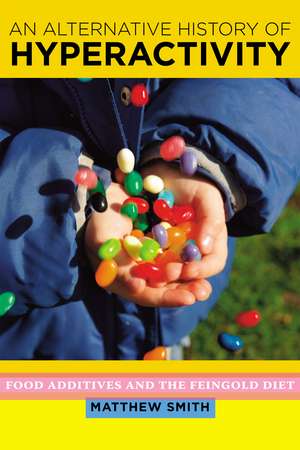An Alternative History of Hyperactivity: Food Additives and the Feingold Diet: Critical Issues in Health and Medicine
Autor Matthew Smithen Limba Engleză Hardback – 29 iun 2011
In 1973, San Francisco allergist Ben Feingold created an uproar by claiming that synthetic food additives triggered hyperactivity, then the most commonly diagnosed childhood disorder in the United States. He contended that the epidemic should not be treated with drugs such as Ritalin but, instead, with a food additive-free diet. Parents and the media considered his treatment, the Feingold diet, a compelling alternative. Physicians, however, were skeptical and designed dozens of trials to challenge the idea. The resulting medical opinion was that the diet did not work and it was rejected.
Matthew Smith asserts that those scientific conclusions were, in fact, flawed. An Alternative History of Hyperactivity explores the origins of the Feingold diet, revealing why it became so popular, and the ways in which physicians, parents, and the public made decisions about whether it was a valid treatment for hyperactivity. Arguing that the fate of Feingold's therapy depended more on cultural, economic, and political factors than on the scientific protocols designed to test it, Smith suggests the lessons learned can help resolve medical controversies more effectively.
Matthew Smith asserts that those scientific conclusions were, in fact, flawed. An Alternative History of Hyperactivity explores the origins of the Feingold diet, revealing why it became so popular, and the ways in which physicians, parents, and the public made decisions about whether it was a valid treatment for hyperactivity. Arguing that the fate of Feingold's therapy depended more on cultural, economic, and political factors than on the scientific protocols designed to test it, Smith suggests the lessons learned can help resolve medical controversies more effectively.
Din seria Critical Issues in Health and Medicine
-
 Preț: 254.52 lei
Preț: 254.52 lei -
 Preț: 232.10 lei
Preț: 232.10 lei - 5%
 Preț: 241.99 lei
Preț: 241.99 lei -
 Preț: 184.80 lei
Preț: 184.80 lei - 5%
 Preț: 241.78 lei
Preț: 241.78 lei - 5%
 Preț: 314.84 lei
Preț: 314.84 lei - 5%
 Preț: 292.69 lei
Preț: 292.69 lei - 5%
 Preț: 318.35 lei
Preț: 318.35 lei - 5%
 Preț: 311.37 lei
Preț: 311.37 lei - 5%
 Preț: 1076.59 lei
Preț: 1076.59 lei -
 Preț: 287.67 lei
Preț: 287.67 lei - 5%
 Preț: 270.90 lei
Preț: 270.90 lei -
 Preț: 315.48 lei
Preț: 315.48 lei - 5%
 Preț: 293.77 lei
Preț: 293.77 lei - 5%
 Preț: 427.88 lei
Preț: 427.88 lei - 5%
 Preț: 1078.40 lei
Preț: 1078.40 lei - 5%
 Preț: 296.39 lei
Preț: 296.39 lei - 5%
 Preț: 288.29 lei
Preț: 288.29 lei - 5%
 Preț: 298.62 lei
Preț: 298.62 lei -
 Preț: 304.61 lei
Preț: 304.61 lei - 5%
 Preț: 298.77 lei
Preț: 298.77 lei -
 Preț: 312.21 lei
Preț: 312.21 lei -
 Preț: 286.52 lei
Preț: 286.52 lei - 5%
 Preț: 276.52 lei
Preț: 276.52 lei - 5%
 Preț: 305.79 lei
Preț: 305.79 lei - 5%
 Preț: 1079.33 lei
Preț: 1079.33 lei - 5%
 Preț: 299.90 lei
Preț: 299.90 lei - 5%
 Preț: 290.87 lei
Preț: 290.87 lei - 5%
 Preț: 410.09 lei
Preț: 410.09 lei -
 Preț: 259.27 lei
Preț: 259.27 lei -
 Preț: 305.55 lei
Preț: 305.55 lei - 5%
 Preț: 314.32 lei
Preț: 314.32 lei - 5%
 Preț: 262.95 lei
Preț: 262.95 lei - 5%
 Preț: 277.67 lei
Preț: 277.67 lei - 5%
 Preț: 301.72 lei
Preț: 301.72 lei - 5%
 Preț: 280.06 lei
Preț: 280.06 lei
Preț: 377.48 lei
Preț vechi: 496.24 lei
-24% Nou
Puncte Express: 566
Preț estimativ în valută:
72.23€ • 77.24$ • 60.22£
72.23€ • 77.24$ • 60.22£
Carte indisponibilă temporar
Doresc să fiu notificat când acest titlu va fi disponibil:
Se trimite...
Preluare comenzi: 021 569.72.76
Specificații
ISBN-13: 9780813550169
ISBN-10: 0813550165
Pagini: 262
Dimensiuni: 152 x 229 x 25 mm
Greutate: 0.54 kg
Ediția:None
Editura: Rutgers University Press
Colecția Rutgers University Press
Seria Critical Issues in Health and Medicine
ISBN-10: 0813550165
Pagini: 262
Dimensiuni: 152 x 229 x 25 mm
Greutate: 0.54 kg
Ediția:None
Editura: Rutgers University Press
Colecția Rutgers University Press
Seria Critical Issues in Health and Medicine
Notă biografică
MATTHEW SMITH is a Wellcome Trust Research Fellow at the University of Exeter, UK. He received the American Association for the History of Medicine's Pressman-Burroughs Wellcome Award in 2010.
Cuprins
Acknowledgments
List of Abbreviations
1. Food for Thought
2. Why Your Child Is Hyperactive
3. Feingold Goes Public
4. The Problem with Hyperactivity
5. “Food Just Isn’t What It Used to Be”
6. The Feingold Diet in the Media
7. Testing the Feingold Diet
8. Feingold Families
9. Conclusion
Bibliography
Notes
Index
List of Abbreviations
1. Food for Thought
2. Why Your Child Is Hyperactive
3. Feingold Goes Public
4. The Problem with Hyperactivity
5. “Food Just Isn’t What It Used to Be”
6. The Feingold Diet in the Media
7. Testing the Feingold Diet
8. Feingold Families
9. Conclusion
Bibliography
Notes
Index
Recenzii
"This exciting book makes a significant contribution to the history of hyperactivity by investigating the Feingold diet from many different vantage points and examining the historical context in which this treatment was situated."
"An Alternative History of Hyperactivity provides a novel dissection of a controversial medical treatment, illuminating many of the issues that characterised American medicine in the late twentieth century while simultaneously giving much-needed attention to the experience of patients and their families."
Descriere
An Alternative History of Hyperactivity explores the origins of the Feingold diet, revealing why it became so popular, and the ways in which physicians, parents, and the public made decisions about whether it was a valid treatment for hyperactivity. Arguing that the fate of Feingold's therapy depended more on cultural, economic, and political factors than on the scientific protocols designed to test it, Smith suggests the lessons learned can help resolve medical controversies more effectively.
